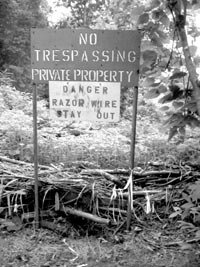Razor's edge: City takes trail blocker to court
Normally, citations from city building code inspectors don't end up in court. The offending property owner trims her hedges or cuts his grass within the required 10 days, and the issue ends.
That isn't the case with Shirley Presley, who was cited almost a year ago for allegedly stringing razor wire on her Bland Circle property to block Rivanna Trail-goers from hiking across her land on the Rivanna River, near the VFW Lodge on River Road.
On June 29, Presley has a date in Charlottesville General District Court for failure to remove the razor wire. And her attorney, Fred Payne, apparently plans a spirited defense, with13 witnesses on his subpoena list.
Former mayor and Rivanna Trail Foundation board member John Conover has been visited by a deputy with a piece of paper demanding his presence in court. So have City Manager Gary O'Connell, Deputy City Attorney Lisa Kelley, planning chief Jim Tolbert, and City Councilor Kevin Lynch– and even Hook reporter Courteney Stuart, who has written about Presley's efforts to protect her property.
Still to be served at press time: Police Chief Tim Longo and four other city police officers.
On June 7, Assistant Commonwealth's Attorney Joe Platania filed a motion to quash the subpoenas of six city employees.
The case was set in motion– inadvertently– 14 years ago when the Rivanna Trails Foundation was formed to create a series of footpaths to encircle Charlottesville. Today the organization has created more than 18 miles of trails around town, and the route is listed as a National Recreation Trail.
One big problem: Organizers in the early days sometimes neglected to get property owners' permission to have the trail cross their land. Presley was not asked.
When she erected a brush pile in 2002 to block the trail, Presley set off a contentious debate between trail supporters and those who believe her property rights were violated.
The Rivanna Trails Foundation removed its trail markers, pulled RTF maps showing the route, and added detours directing hikers away from Bland Circle.
Apparently that wasn't enough. Last summer, 30 feet of razor wire appeared across Presley's property along with a sign reading, "Danger, razor wire. Stay out." Presley did not return phone calls from The Hook.
"This Presley thing is really upsetting me," says Jerry Tomlin, the city official who cited her July 18, 2003. "It's purely illegal to have razor wire in the city."
Tomlin is referring to Section 5-152 of the Charlottesville City Code, which allows razor or barbed wire only on commercial properties at six feet or higher. Violation is a Class I misdemeanor, punishable by a fine up to $2,500 and/or up to 12 months in jail.
Many a city property owner has blanched at receiving a citation from the city that gives them 10 days to trim an overgrown privet hedge. So why was Presley, whose property had concertina wire at pet or child level, allowed six months to comply?
"It was an oversight," says Tomlin. City code failed to bring this barbed or razor wire into its nuisance code. "Who would have thought," asks Tomlin, "someone would put razor wire on the ground?"
In August 2003, City Council closed the loophole by making the use of such wire an offense, like overgrown grass, that must be corrected in 10 days.
In Presley's case, the city honored the six-month period, says Tomlin. But when that time limit expired, Tomlin says he tried to negotiate– to no avail.
On April 7, Tomlin issued a 10-day notice, and on April 17, he got a warrant. "I didn't want to take this woman to court," he says.
He says Presley seems to be mounting a property rights case that sidesteps the city code.
Payne declines to comment on his defense– or his subpoena list. However, he does remark: "I think somebody should be left alone on her property."
And he adds, "Please note, I've never told you there's razor wire on her property, and she's never said there's razor wire."
Yet on a Monday, June 7, visit, the wire was plainly visible. A Hook editor approaching from the south found the shiny coiled concertina wire– more often found atop prison walls and junkyard fences– at knee level in front of a warning sign.
But what about humans and animals that can't read? Have there been any injuries?
"I don't feel comfortable commenting on that at this time," says Assistant Commonwealth's Attorney Platania.
Few building code violations become criminal cases in general district court. And as for those involving razor wire, "This is the first one brought to my attention," says Platania, who calls the case "a community safety issue."
"I have a problem with this," says Tomlin. "Anyone with common sense should know this is illegal."
As for the subpoenas of a reporter and city employees, says Tomlin, "It's like driving 100 miles per hour on the Bypass. Do you want to subpoena everybody on the Bypass? It's still illegal."

As seen in this photo taken Monday, June 7, near-ground concertina wire fortifies Presley's property.
PHOTO BY HAWES SPENCER
#